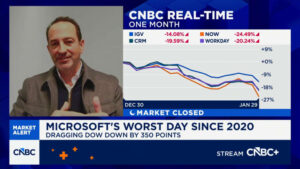I often talk about my Kurzweilian Rate of Change theories, which are based on the idea that innovation accelerates exponentially over time (adapted from Ray Kurzweil’s book The Singularity Is Near).
The idea is, for example, that it took thousands of years for the wheel to become a chariot, and it took hundreds of years for the chariot to become a car, and it took dozens of years for a car to become a computer on wheels that can drive itself — and it will take just a handful of years for the computer on wheels to become a driverless taxi.
We don’t know what will come after that — but it won’t take long before the next revolution comes.
Likewise, one of the most impressive things about artificial intelligence, such as ChatGPT, is how it’s already getting better so quickly. Nowadays I’m often asked how best to invest in AI. I wish I had a simple answer, like “Buy Nvidia
NVDA,
!”
I’ve been long Nvidia in my personal account since I first bought it at a split-adjusted $7 per share back in 2017. Back then, I talked about how its AI strategy was one of the reasons I thought it was a must-own and a forever-stock in my personal account. But Nvidia’s current valuation makes me worried that there’s more downside than upside potential in the stock right now.
So I asked Bard, Alphabet’s Google’s
GOOGL,
rival to ChatGPT, “Pick a stock that Cody Willard would like and write a 1,000 word article about it in his style.”
Sure enough, Bard picked Nvidia as the stock I would like and wrote about how the AI revolution is incredibly innovative, and therefore also something I would like. Bard predicted that Nvidia would be a prime beneficiary and driver of this AI revolution.
Then I asked ChatGPT the same question. It picked Advanced Micro Devices
AMD,
as the stock I would like. Here’s what it said: “The rise of AI and machine learning is also driving demand for high-performance processors.”
Avoid the crowd
So if everybody I know is focused on investing in the AI revolution, and if AI-related stocks have already run up big from their lows last year, and if everybody’s now trying to become an AI guru, and even AI programs pick AI as the sector I would like — then maybe the AI stocks actually are too crowded for my liking.
So I asked ChatGPT and Bard to each write about how innovation investing is too crowded because too many investors are piling into the AI space. Here’s a highlight from their responses:
ChatGPT: “While the AI Revolution certainly presents many exciting opportunities for investors, it’s also becoming an increasingly crowded space. Too many investors are piling into the same handful of companies, driving up valuations and making it difficult for investors to find true value.”
Google Bard: “The AI Revolution is one of the most exciting and promising areas of innovation in recent years. With the potential to revolutionize everything from healthcare to transportation, it’s no wonder that so many investors are eager to get in on the ground floor. However, this enthusiasm has led to a crowded field of AI startups, many of which are still in the early stages of development. This has made it difficult for investors to identify the best opportunities.”
I am quite confident that AI will be a multi-trillion dollar revolution. But as I’ve been saying for two years now, being an innovation investor is not contrarian or unique right now — it’s crowded. It reminds me of being a dot-com investor just before those stocks imploded.
My best advice about AI stocks right now is to avoid them. Stick with Nvidia and Alphabet and maybe Microsoft
MSFT,
Avoid C3.ai
AI,
which doesn’t seem to have much proprietary AI of its own and has been the target of short-seller reports of accounting irregularities. I’d also avoid other small-cap stocks that are considered AI pure-plays, including BigBear.ai
BBAI,
SoundHound AI
SOUN,
and Sprinklr
CXM,
I’m not sure we’ll see the kind of hatred for AI that was unleashed on internet stocks in 2002, or the apathy for technology investing overall that we saw from 2010-2018. But the crowded nature of AI is indicative that we’re not being contrarian by investing in this sector right now.
Cody Willard is founder of 10,000 Days Fund Capital Management and runs the 10,000 Days Fund, a hedge fund. Bryce Smith contributed to this article. Smith is an analyst at 10,000 Days Fund Capital Management.
At the time of publication, Willard, Smith and/or the hedge fund were long AAPL, AMZN, NVDA, GOOGL, TSLA and had put positions on AI and AMD. Positions can change at any time and without notice.
This post was originally published on Market Watch






